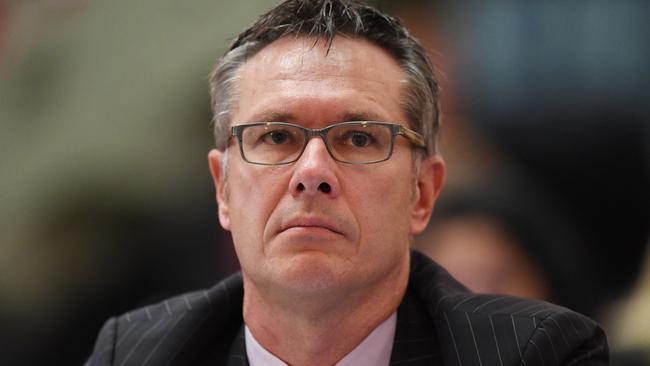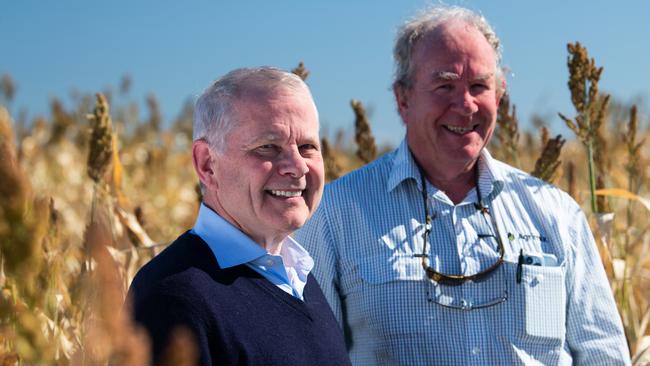Climate legislation a positive for Australia on global stage, says Fortescue Future Industries’ Guy Debelle
Former RBA deputy governor sounds note of urgency on climate investment decisions and funding.

Labor’s climate change legislation has sent a positive signal to the global investment market on Australia’s commitment to emissions reduction, Fortescue Future Industries chief financial officer Guy Debelle has said.
Speaking at an AICD climate governance forum on Monday, the former deputy governor of the Reserve Bank, who this year moved into the private sector with the FFI appointment, sounded a note of urgency on the need for investment decisions and funding to get Australia to meet its climate goals.
“(Climate legislation) certainly sends a positive signal that wasn’t there before, and which was highlighted to us by foreigners in terms of their consideration of their investment decision. It certainly sets a baseline,” Dr Debelle said.
“(But) a fair chunk of corporate Australia has been out in front on it. At Fortescue we’re at net zero by 2030, not 43 per cent lower by 2030, so there’s a fair chunk of corporate Australia that is already out in front of this, which makes it makes the objective easier to achieve.”
The challenge now is on the urgent need for investment decisions and funding, he added.
“Those investment decisions need to be taken now. We’re having to look at a fairly large-scale investment program to achieve those net zero objectives by 2030. So you need to be doing it now and you need to be funding it now. You need investors need to understand the environment you’re operating in.”
Australia has a “great opportunity” to be a renewable energy exporter to the world, he said, as he warned on the macroeconomic and financial stability concerns around climate change and net zero ambitions.
“You don’t want to be lending to companies that are going to be stuck with stranded assets, probably not a good credit decision. So you want to have a framework to be able to assess that.
“You also generally want to be lending to companies with good opportunities, and if the opportunities are in the climate transition space, it’s probably good idea to have an understanding of that as well,” Dr Debelle said.
Speaking at the same forum, NAB chairman Phil Chronican called out the “massive” commercial opportunities in financing the climate transition, as he noted recent supply interruptions to power in Australia had emphasised the importance of energy security and the need for an orderly transition to renewable energy.
Banks needed to play their role on the path to net zero, Mr Chronican said.
“As a priority, we’re working with 100 of our largest emitting customers to develop or improve their transition plans by 2023, and we’re supporting customers in this decarbonisation journey and to help them build resilience to climate change,” Mr Chronican said.
“Across the industry, there‘s an increasing recognition of the importance of protecting and restoring natural environments and the correlation that has for long-term profitability. So the commercial opportunity to finance this climate transition is massive.
“The low carbon solutions that have to be developed and deployed from this transformation require significant investment. Disruptive innovation will involve some risk taking and the co-ordination and the backing of business industry and government will be critical.”
Labelling the future of gas in the energy market a “gnarly” issue, Mr Chronican conceded the big four bank’s carve out for energy security in its net zero plan could see it lend to greenfields gas projects in the future.
“We have set an upper limit on oil and gas extraction … we’ve also put restrictions on that into greenfields gas projects. We won’t finance any greenfield oil extraction project or on board any new customers focused on extraction into new coal mining projects …
“We did put a carve out for energy security (in the plan), which is if there were a security issue we would be prepared to look at (opportunities) that go against our policy. But you’d have a pretty compelling argument to do that,” Mr Chronican said.

Australia has an opportunity to be a leader in renewable resources and low carbon technologies, he added.
But carbon credit markets had a credibility problem, he said.
“Some of them, I would say, are pretty dodgy and therefore there’s a credibility problem with many of them.
“When we talk about net zero and 2050 we have to assume that the word net has meaning and therefore there will be some emissions somewhere in the economy. But that must be offset by emissions extracting activities. We can’t think that we can just go and buy carbon credits … there will never be enough.”
NAB last week backed Labor’s action on climate change legislation, as the bank released a report on the economic benefits of the shift to a net-zero economy.
All up, around $20 trillion will be invested in the economy out to 2050, regardless of an emissions transition, the research, completed by Deloitte for NAB, found.
“The Australian economy is going to grow and it’s going to increase its investments anyway. What we need to be changing to where that money is spent. This is the great reallocation and transformation that we know Australia can afford,” Mr Chronican said.
“We are uniquely placed to expand and develop a credible offsets market. Australia‘s transition to a low carbon economy is at a critical stage and if we get this right over the next decade the opportunities are immense, both in protecting our environment and to growing the economy.”
By 2030, $70bn will need to shift away from emissions-intensive industries and into low-emissions activity to avoid driving up the cost of the transition over the long run.
Alongside this, a further $420bn in new investment will be needed over the next 30 years to position Australia’s economy for growth in a low emissions world, the report said.







To join the conversation, please log in. Don't have an account? Register
Join the conversation, you are commenting as Logout